- Home
- A. S. Byatt
The Game Page 2
The Game Read online
Page 2
The man manoeuvred the snake so that its head was turned with the open mouth exposed to the camera. Against the dark leaves the mouth-tissues were white, bright, clean.
‘This whiteness of the mouth is the reason for the name of the cotton-head snake,’ he informed them; he went on to expatiate, soberly, technically, on the fangs, the venom, the ducts, the hooking and striking of the creature.
‘This snake is a rapid mover; it does not hesitate, or make frenzied manoeuvres for position, as the rattlesnakes do. It strikes on sight …’
He paused, looked puzzled. ‘It’s a much less horrible death than many. I’ve never understood why people find it so peculiarly distasteful. Compared, for instance, to pig-sticking. Or, for that matter, to being hanged. People get very emotional about snakes. It’s a kind of emotion I think we can’t afford – in any area of life – to feel. Not many of us feel that motor-cars are evil. But they are equally lethal. And occasionally possessed by murderous rage. I don’t know whether people think snakes are evil because they are venomous, or fear the venom – disproportionately – because they think the snake is evil. I hope – after a time – to make snakes seem familiar. Familiar. One ought to live neutrally. To see these as a form of life, simply. One form of life, yes.’ He put a weight on the words, almost desperate with unexploded implications; this, too, was a trick Julia remembered; but the public, impersonal intimacy of the television exaggerated it. ‘I am a professional herpetologist so we shall be greatly – not exclusively – concerned with snakes.’
The camera left him to settle, suddenly and irrelevantly, on a flock of white water-birds, wading and calling. Then it was over; the Reverend William Borran smiled fluently, and began to speak of how we have followed too much the devices and desires of our own hearts. Julia stood up and switched him off. Her hands were sweating. The room seemed damp and hot, like a greenhouse. It seemed logical, in retrospect, that he should have come to this; ironing out the knowledge of good and evil in a scientific way, in the jungle. She had never understood what drove him. She had never come to terms with him. She sat for some time, her head in her hands, knotting her red hair with her fingers, looking at the blank screen.
Chapter 2
‘WE shall do better,’ Cassandra wrote, ‘to think of chastity as purity, a scrupulous purity, and to associate it with innocence, if we are to apprehend at all the moral force either of Lancelot’s sin or of Galahad’s virtue in the Morte d’Arthur. Chastity as the supreme virtue is not an automatically acceptable idea. Most of us would preserve our brother’s life before a maiden’s maidenhead, or decide, if faced with the alternative of the immediate suicide of not only one but twelve ladies that the preservation of our own virtue in these circumstances is perhaps a little selfish and a little prudish. We shall do better if we think of “that which the maiden would never have again” as an original innocence – and extend the meaning of “intact” to the whole spirit, uninvaded and complete. If we remember that to a true Christian death is not dreadful, we shall face Lionel’s death with greater equanimity, even before we discover that it is an illusion of the fiend.’
She laid down her pen and considered these things. About chastity it was difficult to think clearly, if, as she did, one enjoyed it in an occupational and accidental way. It did not appear to her to be either purity or innocence; largely ignorance, perhaps; occasionally the source of a hot, devouring curiosity she had felt as a child and hoped to grow out of. As for death, that seemed increasingly dreadful, and her Christianity made sadly little difference to her imaginings. She looked surreptitiously at her watch. It was ten, not time yet. She had completed her prescribed hours on the Malory edition; she marked these off, in red, in her desk diary, and began a letter.
‘Dear Father Rowell, I agree entirely with you about the arrangements for R. S. Thomas’s reading. Naturally the Ladies will come. It should also be publicized as far as possible amongst all undergraduates; this must be one of the rare occasions when Church and secular world have a genuine and useful common area of interest. I agree with you also that the Welsh nationalism is an irritant. But clearly the poet is in need of it, if not the poems, many of which I would not be without.’
She stopped again for some time, thinking that she had now made enough conversation but did not know how to open the other topic. She looked at her watch again. She wrote: ‘It was kind of you, Father, to write as you did of my nightmares and fears. As you will have guessed, I have regretted intermittently what I told you of this. It was a moment of weakness, but not one for which I can ultimately be sorry since you can write to me with such untroubled understanding.’
She paused again, to reflect that this was not quite true. Father Rowell had expressed only a limited understanding, and what he had said was not entirely untroubled. She should have said nothing: she had lost dignity, exposed herself, forfeited, perhaps, some of his respect. Still, what was done was done. ‘I have prayed as you directed,’ she continued, ‘and I may truly say things are better. We are all afraid of being overwhelmed in one way or another; but I have lived with these fears for many years now and I meet them, to a certain extent, with the ease of familiarity.’
Also not true. Or at least, what familiarity brought was not necessarily ease. She wrote a few carefully relaxed sentences of parish gossip and signed her letter. Then she took up an essay on Troilus and Criseyde, written in obvious haste on three sides of paper torn from an exercise book, and clearly largely cribbed from C. S. Lewis.
‘If this essay were cleaner,’ she wrote, ‘it might be possible to read it with closer attention. You seem unaware that the statement of Criseyde’s feelings you quote from Lewis, without acknowledgement, on your second page, directly contradicts what you say in propria persona on your third. Your work has been consistently of this poor quality. I shall find it almost impossible to report well of it to your Scholarship authorities at the end of the term.’
She looked at this for some moments. She remembered the author of the essay very well; a large, hairy-legged, lumpish girl, the first from her obscure Welsh grammar school to be admitted to the College, and then against Cassandra’s advice. She sat almost silent through tutorials, her huge white face staring with carefully black-rimmed eyes out of a Lake-dweller’s hut of cross-woven colourless hair, over the shapeless bulk of a dirty white mohair sweater. When Cassandra spoke to her she twisted fat white hands in agitation and pulled at hang-nails. Another don had told Cassandra that she was having an unhappy love affair; last year’s work had been markedly better. It happened to all of them, Cassandra thought with distaste, even those apparently hors de concours through ugliness. It seemed to reduce them all to the same state of incompetent, inattentive weariness. It was not as though cuddling – or being deprived of cuddling – on a lodging-house sofa made them any more sensitive to the subtleties of Chaucer’s portrayal of the protracted decay of affection. It simply made them weary. Whereas her own generation, deprived of such inept experience, had had time to become aware of what was possible, of the subtleties of passion, through the imagination.
And here, she thought, looking again at her watch, I am. Here I am. Imagination and all, God knows. Her mouth was dry; there were fifteen minutes to go. She wrote on the bottom of the essay, ‘You had better come and see me about this.’ She knew that this, which was in fact a moral concession to the shapeless Miss Wood’s problems, would be taken as persecution on her part. She was vaguely aware, too, that she would not be able to resist the temptation to be sarcastic. And that Miss Wood would assume that she did not, herself, ‘know’. Well, she did not. But neither did Miss Wood, and money, and Cassandra’s time, and Oxford were all being spent on Miss Wood’s failure to acquire any relevant knowledge.
She stood up, and went to the window, still tense with fear. She pulled back the curtain and saw, partially, since it was late, Oxford, in winter, at night. The river ran under her window; a few bare trees caught the light from a street lamp; in a patch of light an odd spire s
tood out, haphazardly suggesting all the rest of the post-card view. Twenty years ago, in the middle of war-time austerity, she had come there – expecting God knew what mediaeval grace of life and significance.
She saw herself, for a moment, coldly from outside – a feeling she disliked, and had invented little rituals to avoid. She dropped the curtain again, now, closing herself in, and looked over her room and her work. She was surrounded by solid things: leather-bound books, a collection of early globes and maps of the heavens, ivory carvings, the crucifix over the desk, some of them rare, acquired, not inherited, and acquired slowly. Velvet curtains, heavy dark furniture, two or three footstools and an immensely high-winged crimson velvet chair – the room had an inhabited thickness. Cassandra looked from object to object and was relieved to see nothing but what was solidly there.
She was thirty-eight and saw herself alternately as much older and much younger; during the nightmares she was younger, but in public she assumed the curt bark and the dogmatism of the old and fixed in their ways; she affected to have been young somewhere at the turn of the century, which was a partial truth since she had had an isolated and traditional country upbringing. Like most mediaevalists she had chosen her subject out of an essentially Romantic preoccupation with the satisfactory remote violence of both the religious and the secular literature of the Middle Ages. She had come to Oxford hungry for the absolutely worked drama of Lancelot and Guenevere, Tristan and Iseult; she had slowly transmuted this into a passion for the symbolic possibilities of the Grail Legend. She combined the mediaevalist’s love of the strange with the mediaevalist’s passion for precision. The complexities of existence were the interrelations of roots and roses, strange beasts and fruits, in a walled garden, outside which a sea rose in formally dangerous peaks. She had elaborated, and believed, a network of symbols which made the outer world into a dazzling but comprehensible constellation of physical facts whose spiritual interrelations could be grasped and woven by the untiring intellect; suns, moons, stars, roses, cups, lances, lions and serpents, all had their place and also their meaning. This network was overlaid by another network, interweaving other roots, footnotes, cross-references, bibliographical data, palaeographical quirks. Somewhere, under the network, the truth shone; Cassandra had come, like many others, looking for final Authority, logically to see it in the Church. This was a symbol, and also real; it was a guarantee. A passion for symbols is in some cases an automatic precursor of a passion for theology. Cassandra had embraced both.
But now and then, in certain moods, Cassandra remembered the root of this passion in the wash of romantic feeling with which she had first seen Oxford, having read indiscriminately in Walter Scott, Tennyson, Morris and Malory, looking for a life as brightly-coloured as books. She had not had then an interest in the conventions of the courtly love of the Roman de la Rose; she had cared about the feelings of Lancelot and Guenevere, disturbed in their blood-stained sheets. She had come, not from Ritual to Romance, but in the other direction, from romance to ritual. Her feeling for completeness had betrayed her to a way of life she had not quite chosen; the academic life had become almost accidentally a branch of the contemplative life. She had cultivated her walled-garden skills at the expense of any others she might have had. We become what we are, she told herself, by a series of involuntary half-choices; if this was not what she had meant, she did not know what else she could have done.
She looked at her watch again. She would, at least, go and see. The room might well be empty.
She went out along two corridors, down a flight of stairs into an entrance hall, almost silently, and then along another corridor. She wore, at night, sensibly, she considered, in draughty corridors, a long black woollen evening skirt, over which she wore a long-sleeved black jersey with a cowl neck. She affected cuffed and pointed black velvet slippers. These clothes gave her a certain monastic, anachronistic grace; she was thin, and carried herself well although a little rigidly. She was, however, hung about with chains, medallions, crosses, knotting and clinking from neck to waist; she had three rings, all jewelled, the largest a large garnet, clustered round with seed pearls. Her head, covered with a crop of rust-coloured dry curls, she carried stiffly erect. From behind, she looked sexless; from the front, formidable, with huge nose and mouth and eyes too deep-set under almost colourless sandy lashes. Her skin was very white and spattered and blotched with freckles. These seemed unexpected, as though freckles should have been outgrown with childhood; they blurred and detracted from the general impression of well-ordered ugliness.
She had decided not to go into the S.C.R. It was there, last week, that she had accidentally seen the first programme, but she could not imagine many other dons wanting to watch a travel programme about snakes, and was in any case peculiarly secretive about her own interests. The J.C.R., she had discovered, was usually empty at this time of night, since these girls were not interested in communal living and spent their evenings outside the college until the last possible moment. They showed, too, a commendable lack of interest in the television.
She slipped in, closed the door, and stood with her back against it, breathing rapidly. The room was dark and the television was, in fact, switched on; Cassandra found that she was the back row of an audience – three girls curled on a sofa immediately in front of her, two more squatting at their feet. The room was silent, except for a soft rustle which came from the set itself. Cassandra thought of retreat; but no one looked at her, and then he spoke.
‘It is the apparent effortlessness of this movement that makes us feel it is mysterious. And we are naturally afraid of what we do not understand.’
Cassandra found herself watching the progress of a long and apparently heavy snake across a sandy surface. The movement, even in so heavy a body, did seem to be unconnected with any effort; like a creature in a dream landscape it poured forward, stopped suddenly as though it were frozen, head raised, tongue flickering, and then flowed on again, stretched and easy. The ground underneath it seemed still and solid – behind it was a ribbon-like track.
‘They are worshipped in association with running water and with lightning. As a symbol – for the life, the life that drives us. Although in our culture, traditionally, we see them as the opposite.’
The snake had come to the edge of a dark pool of water: it bowed its head, swaying the blunted, triangular snout slightly, slid under the surface, was lost, and then the camera held for a moment the raised head and the rippling trail of its body in the water as it swam out and away.
‘The people here tell me that during the night the anaconda changes into a dark boat with white sails, and skims over the swamp. They speak of it also as though it were winged. There’s an element of fear in what they say – I don’t know whether the wings and sails turn the creature into a ship of death, or a more ambiguous symbol of some kind of release from the earth. They believe also, erroneously, that the boas are poisonous.’
There was the recognizable, inconclusive pause for thought; then a tentative ‘I suppose as a religious symbol it may well be more paradoxically used than any other – natural phenomenon.’ Then, more surely, ‘We know, in fact, very little about how snakes move. They have three basic types of progress – lateral, undulatory motion, rectilinear locomotion – which you have just seen – and “sidewinding”, usually observed in desert snakes. They are able to travel much faster over rough surfaces than smooth. This snake was in no hurry. If it were, it would progress in a sideways, curving movement, to take advantage of the surface. Contrary to earlier belief, movement is produced, not by the ribs, but by successive contractions of groups of muscles …’
A diagram of the muscular contractions of the anaconda was followed somewhat abruptly by the apparition of Simon, who stared anxiously out from under the shade of some canvas hut or shelter where he sat cross-legged like the Buddha, surrounded by his snake-trapping instruments. He expatiated, with nervous fluency, on the muscular structure of the snake, bending with his hands first a clos
ely-knot metal chain and then a dead snake, twisting them double, turning them, to demonstrate the superior flexibility of the snake. Cassandra watched his hands, hairy, with huge knuckles, and his face, pulled into an intent pout. Her knees shook slightly. He produced a small boa from a canvas bag, looped it about his wrist, and went on to explain how the muscles were used in constriction.
‘An economic use of power in a creature which has no exceptional mobility. Most stories of rapid pursuit by snakes are fantasies. There are other fallacies – snakes do not deliberately break bones, nor do they, on the whole, “reshape” their prey – although I have seen snakes tease out a chicken or a monkey into a more easily apprehensible form. Death is due, not as might be imagined, to suffocation, but to constriction of the heart. Constriction of the heart. The constrictors seem to know exactly when death takes place, and will not release any victim before it is dead. Mere unconsciousness does not impress a snake …’
Simon’s face took on a puzzled, faintly anxious expression which was familiar to Cassandra, who clasped her hands suddenly and defensively in front of her.
‘Constriction, like poison when we study it, loses its aura of peculiar terror,’ he said. ‘Coming close to anything – mortality amongst mortals – changes our attitude to it, changes it, in our minds. Whether we are butchers or doctors or simply scientific observers. Familiarity doesn’t make things less mysterious – it does make them less vague. You might say, we learn a real fear, instead of a mystical fear. Out here, you might say, one has a chance to begin again – this part of the world has been less documented, either by naturalists, geographers or social scientists, than any other. It’s a real Garden of Eden, and we have to find our own bearings – map out for ourselves, not good and evil, but what life and death are really like, since we are not immortal. And what is really to be feared. Here, that is not the constrictors. Fire and flood. Certain insects. Bad water. Bathing with a cut finger. Even bad teeth. You have to learn to organize your own survival at first hand. You have to be very close to things that at home you can afford to forget. But, in compensation, they do appear real.’

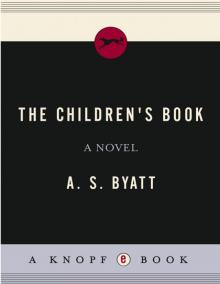 The Children's Book
The Children's Book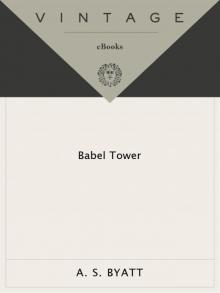 Babel Tower
Babel Tower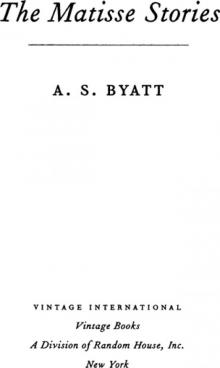 The Matisse Stories
The Matisse Stories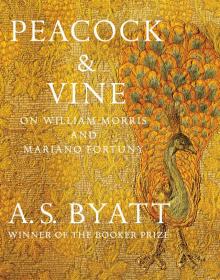 Peacock & Vine: On William Morris and Mariano Fortuny
Peacock & Vine: On William Morris and Mariano Fortuny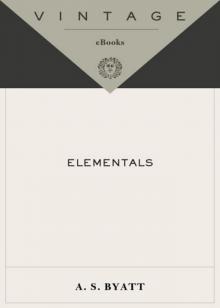 Elementals: Stories of Fire and Ice
Elementals: Stories of Fire and Ice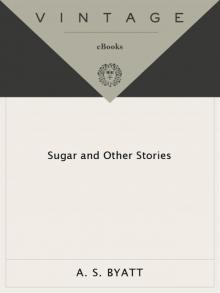 Sugar and Other Stories
Sugar and Other Stories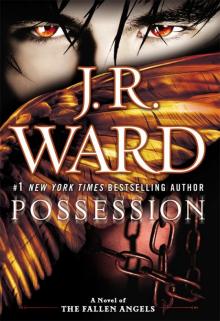 Possession
Possession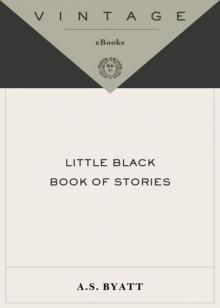 Little Black Book of Stories
Little Black Book of Stories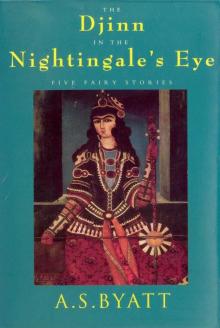 The Djinn in the Nightingale's Eye
The Djinn in the Nightingale's Eye The Virgin in the Garden
The Virgin in the Garden The Game
The Game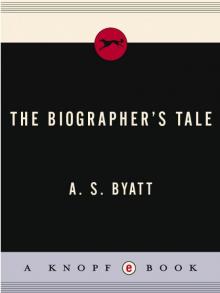 The Biographer's Tale
The Biographer's Tale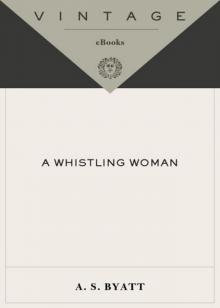 A Whistling Woman
A Whistling Woman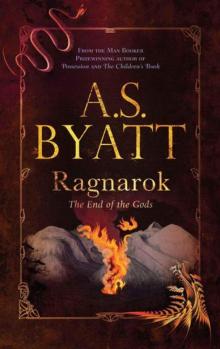 Ragnarok
Ragnarok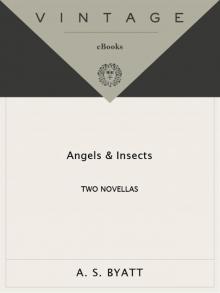 Angels & Insects: Two Novellas
Angels & Insects: Two Novellas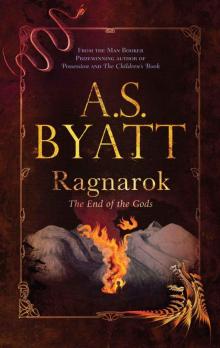 Ragnarok: the End of the Gods (Myths)
Ragnarok: the End of the Gods (Myths)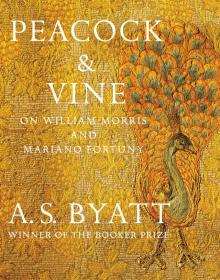 Peacock & Vine
Peacock & Vine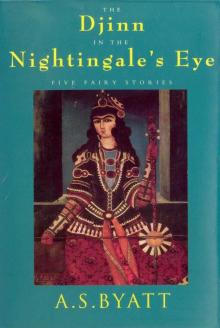 The Djinn in the Nightingale's Eye (Vintage International)
The Djinn in the Nightingale's Eye (Vintage International)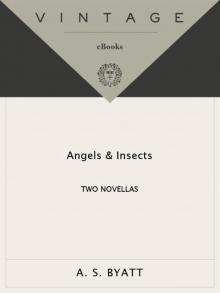 Angels and Insects
Angels and Insects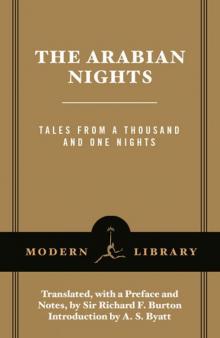 The Arabian Nights: Tales from a Thousand and One Nights (Modern Library Classics)
The Arabian Nights: Tales from a Thousand and One Nights (Modern Library Classics)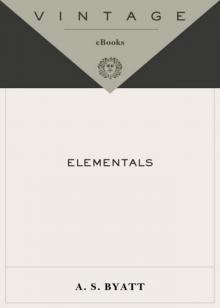 Elementals
Elementals